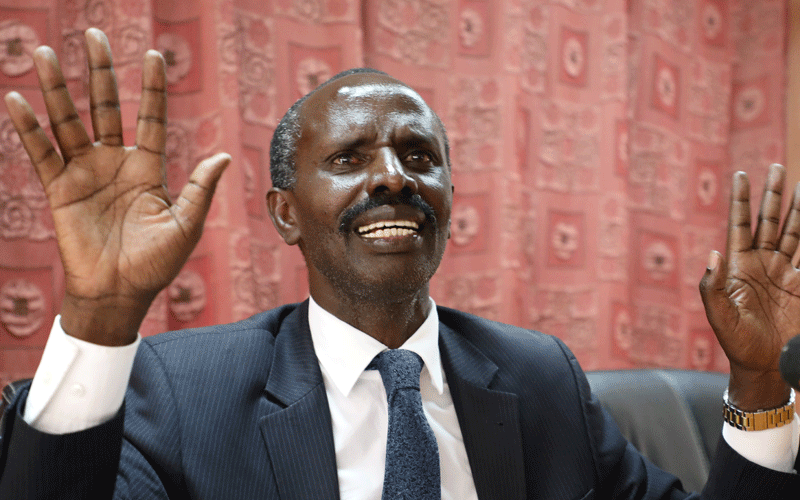We're loading the full news article for you. This includes the article content, images, author information, and related articles.
A renewed battle for control of the Kenya National Union of Teachers pits incumbent Collins Oyuu against his predecessor, Wilson Sossion, whose eligibility is contested following his deregistration as a teacher, raising stakes for the union's stability and upcoming salary negotiations.

A fierce leadership struggle has erupted within the Kenya National Union of Teachers (KNUT), reigniting the rivalry between current Secretary-General Collins Oyuu and his predecessor, Wilson Sossion. The conflict, emerging ahead of the union's 2026 elections, centres on Mr. Sossion's eligibility to contest for his former seat, a matter the incumbent leadership firmly disputes.
Mr. Sossion, who resigned dramatically in June 2021 just hours before an election that saw Mr. Oyuu take the helm unopposed, has publicly declared his eligibility for a comeback, citing "immense pressure" from teachers. Speaking on Thursday, November 13, 2025, Sossion asserted his constitutional right to run, emphasizing his extensive experience in trade unionism and education leadership.
The core of the dispute lies in Mr. Sossion's status as a registered teacher. The Teachers Service Commission (TSC) removed him from its register in January 2018 following his nomination to the National Assembly by the Orange Democratic Movement (ODM) party. The TSC argued that his political role was inconsistent with his position as a public officer and teacher. This deregistration was subsequently upheld by the Employment and Labour Relations Court in May 2021.
The current KNUT leadership, led by Mr. Oyuu, maintains that this deregistration renders Mr. Sossion ineligible to run for office. The KNUT constitution stipulates that candidates for national office must be "professionally trained and qualified teachers" with at least eight years of continuous service and membership. Furthermore, the constitution requires an official to vacate office if they are elected or nominated to Parliament.
Mr. Sossion, however, dismisses these arguments as politically motivated. He contends that he continued to serve as Secretary-General for years after the TSC's action and that he resigned from the position in 2021, not from his union membership. "That politics of deregistration was executed in 2017... I resigned as secretary-general in 2021 but not as a member," he has argued.
This leadership battle comes as KNUT emerges from a period of profound crisis. Mr. Sossion's tenure, which began in 2013, was characterized by a turbulent and confrontational relationship with the TSC and the Ministry of Education. This protracted conflict led the TSC to cease remitting union dues for the majority of members, crippling KNUT financially. By the time of Sossion's departure, the union's membership had plummeted from a high of over 187,000 to just 15,000, with monthly dues collapsing from KSh 147 million to KSh 12 million.
Since taking office in June 2021, Mr. Oyuu's leadership has prioritized mending the relationship with the TSC. This diplomatic shift has yielded significant results. The union has regained its financial footing, and membership has reportedly surged back to over 100,000. Mr. Oyuu's administration has focused on negotiation over confrontation, a strategy that has restored stability but drawn criticism from some quarters for being too conciliatory.
The outcome of this power struggle holds significant implications for Kenya's educators. The union is currently in advanced negotiations with the TSC for the 2025–2029 Collective Bargaining Agreement (CBA). KNUT has tabled a demand for a 60 percent salary increase, citing the rising cost of living. A divisive and protracted election campaign could distract the union's leadership and potentially weaken its bargaining position.
A potential Sossion candidacy threatens to reintroduce the adversarial dynamics that previously brought the union to its knees. His supporters, however, may see his combative style as necessary to wrest greater concessions from the government. Conversely, Mr. Oyuu's camp will argue that their strategy of dialogue and cooperation is essential for continued stability and achieving sustainable gains for teachers, such as the recent promotions of 25,000 educators and the push for permanent employment for intern teachers.
As the election season for trade unions approaches, the battle for KNUT's soul—pitting a firebrand former leader against a pragmatic incumbent—will be closely watched by teachers and policymakers alike. The central question remains whether a deregistered teacher, however popular, can legally lead the very union meant to represent the interests of those actively on the TSC's payroll.
Keep the conversation in one place—threads here stay linked to the story and in the forums.
Sign in to start a discussion
Start a conversation about this story and keep it linked here.
Other hot threads
E-sports and Gaming Community in Kenya
Active 9 months ago
The Role of Technology in Modern Agriculture (AgriTech)
Active 9 months ago
Popular Recreational Activities Across Counties
Active 9 months ago
Investing in Youth Sports Development Programs
Active 9 months ago